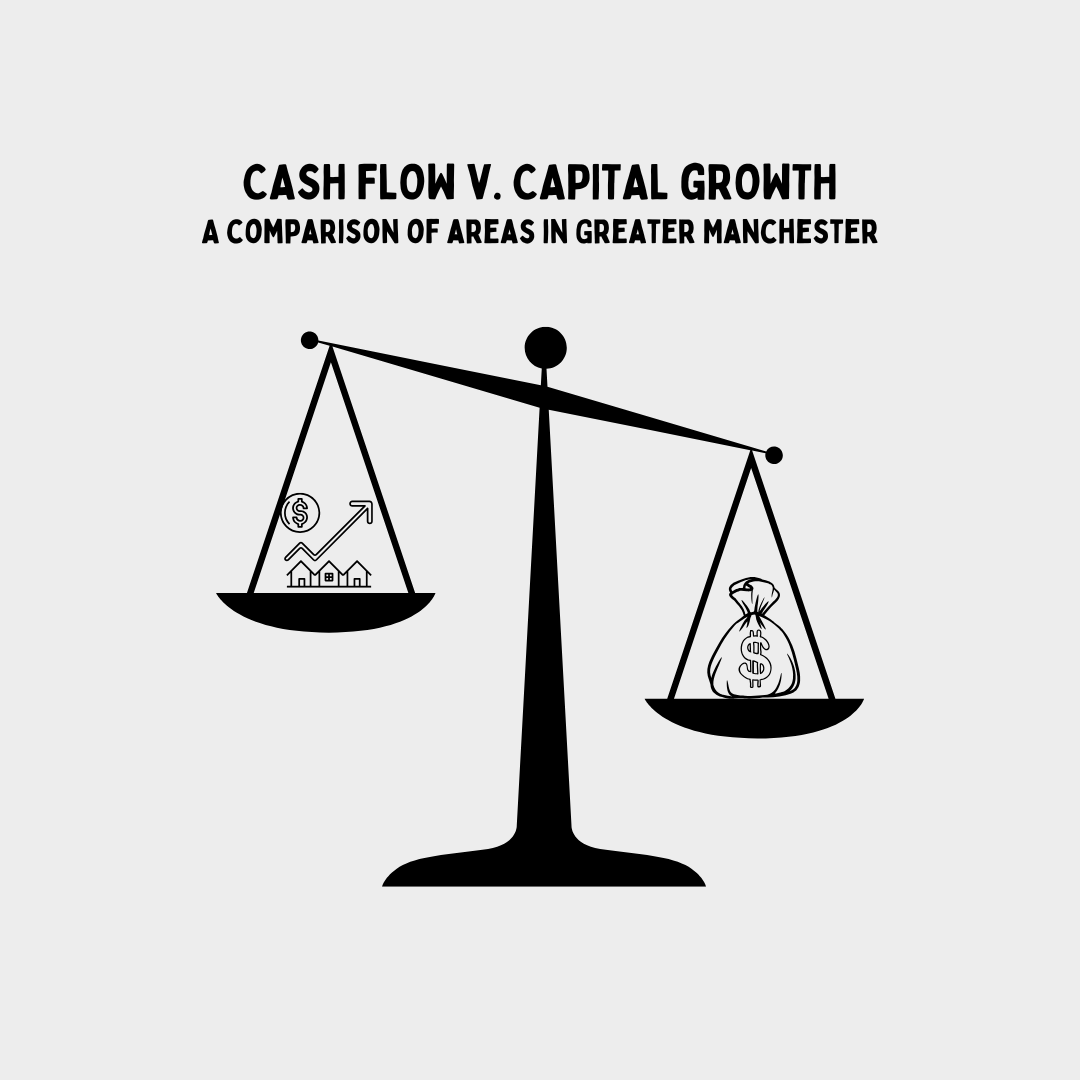As a property investor focusing on Greater Manchester, particularly in Oldham and Trafford, I constantly weigh the pros and cons of two fundamental investment strategies: cash flow and capital growth. Both approaches offer unique advantages and risks, and deciding which one to prioritise can be the key to achieving your long-term investment goals. Here, I’ll share insights into each strategy, considering how the Greater Manchester area presents opportunities and challenges for both.
Cash Flow: The Steady Income Generator
Cash flow is the income you receive from your rental properties after deducting expenses like mortgage payments, property management fees, repairs, and maintenance. A cash flow strategy focuses on buying properties that provide a steady income every month, regardless of fluctuations in property values. For many investors, particularly those looking to replace or supplement their income, cash flow is a primary consideration.
Advantages of Cash Flow in Oldham and Trafford
Oldham and Trafford offer different cash flow opportunities. Oldham, with its relatively affordable property prices, often provides a higher rental yield, especially if you focus on HMOs (house in multiple occupation) or multi-unit buildings. With lower initial investments, Oldham allows you to achieve positive cash flow sooner, which is ideal for investors seeking regular income.
Trafford, while generally more affluent, still offers cash flow potential, especially in neighbourhoods like Stretford or Sale where demand is high among young professionals and families. Properties here might be pricier than in Oldham, but the rental market is more stable, with relatively lower vacancy rates and reliable tenants who may stay longer.
Drawbacks of Cash Flow-Focused Investing
One of the key downsides to cash flow-focused investing is limited capital appreciation. While cash flow properties can provide regular income, they might not see significant growth in value over time, especially if they’re located in lower-demand areas. In Oldham, for instance, property prices have been slower to rise compared to hotspots like Manchester city centre or Trafford.
Additionally, properties focused on cash flow often require higher maintenance or management, especially if you’re dealing with HMOs. These types of properties can be time-intensive, and management fees may eat into your returns if you rely on an agency.
Capital Growth: The Wealth Builder
Capital growth, on the other hand, is the increase in your property’s value over time. A capital growth strategy involves investing in areas where property prices are expected to appreciate, allowing you to build long-term wealth as the asset gains value. This is a less immediate strategy than cash flow but can lead to substantial returns if you choose the right locations.
Advantages of Capital Growth in Oldham and Trafford
Trafford is an area with high potential for capital growth, as it’s a desirable location for families and commuters to Manchester. With strong schools, good transport links, and a vibrant community, property values in Trafford have seen substantial appreciation over recent years. Properties here might not yield as high a rental income relative to their cost, but they offer the promise of steady growth in value, making them a solid long-term investment.
Oldham, too, has potential for capital growth, though perhaps more modest than Trafford. However, the recent push for regeneration and infrastructure improvements in Greater Manchester could see areas like Oldham benefit from spillover effects as city-centre prices push people further out. As transport links continue to improve, property values in Oldham may see a gradual increase, particularly in areas close to new tram stops or other transport projects.
Drawbacks of Capital Growth-Focused Investing
Investing purely for capital growth comes with its own set of challenges. For one, it’s often a “patience game,” where returns may not materialise for several years. In Trafford, higher property prices mean higher mortgage payments, which can reduce or even negate monthly cash flow. Additionally, relying solely on capital appreciation can expose you to market risk. If property prices stagnate or drop, you may find yourself holding a high-cost asset without any immediate returns.
Which Strategy is Better for Greater Manchester?
The best approach depends on your individual goals and risk tolerance. If your goal is to create a stable income stream, Oldham’s higher rental yields may align well with a cash flow-focused strategy. It’s an area where you can achieve strong yields without a massive upfront investment, allowing you to generate income that can be reinvested into additional properties.
On the other hand, if your primary objective is wealth accumulation over the long term, Trafford’s potential for capital growth makes it appealing. While you might not receive substantial monthly cash flow, your asset’s value is likely to grow, especially as Trafford continues to develop as a premium suburb.
Blending Cash Flow and Capital Growth
In reality, many investors in Greater Manchester find themselves blending both strategies. For example, I’ve focused on cash flow properties in Oldham to generate a steady income, which I then use to finance capital growth investments in Trafford. This way, I’m building a portfolio with a balanced mix: income-generating properties in affordable areas and wealth-building assets in high-growth regions.
Balancing cash flow and capital growth allows me to stay flexible and minimize risk. If the market experiences a downturn, I still have income from cash flow properties to rely on, while my capital growth properties provide the potential for a strong return when the market is favourable.
Final Thoughts
Investing in Oldham and Trafford offers unique opportunities for both cash flow and capital growth, and neither strategy is inherently better than the other. The key is understanding your financial goals, risk tolerance, and time horizon. Whether you lean toward cash flow, capital growth, or a hybrid approach, Greater Manchester’s diverse property market offers options to suit a range of investment objectives.
As always, due diligence is crucial. Property markets can change, and factors like interest rates, local development plans, and economic conditions will influence returns. With the right strategy, though, Greater Manchester can be a fruitful region for property investors aiming to build a robust and resilient portfolio.
Melissa, SVG

